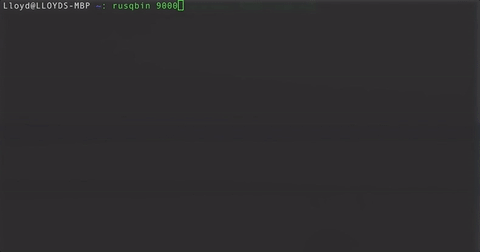Rusqbin 


Rusqbin is a web server that stashes your requests for later retrieval. It is available as a Docker image, a binary, and a library through crates.io.
Rusdocs are published for:
Usage
Web API
The web server has the following API for dealing with request bins.
POST/rusqbins To create a bin and get back bin_idGET/rusqbins To list bin summariesGET/rusqbins/${bin_id} To get bin-specific summary informationGET/rusqbins/${bin_id}/requests To get detailed request information for a bin (lists all requests in the bin)DELETE/rusqbins/${bin_id} To delete a bin
In any other case, send requests with a X-Rusqbin-Id header with a bin_id to have your requests logged to a bin for later retrieval.
Docker
$ docker run lloydmeta/rusqbin:latest
Binary
To use Rusqbin as a binary, simply install it using cargo install rusqbin and then run rusqbin,
and follow the simple usage instructions. The port the server runs on can be set by optionally adding a port argument.
Logging is handled by env_logger, so you can configure it at runtime using
a RUST_LOG environment variable.
Library
To use it as a library, add it to your project as a crate dependency, then from within Rust code:
use rusqbin::storage::*;
use rusqbin::server::*;
use rusqbin::models::*;
use hyper::{Method, Uri};
use hyper::client::Client;
use hyper::client::Request as HyperRequest;
use std::io::Read;
use std::thread;
use std::sync::{Arc, Mutex};
use std::str::FromStr;
use futures::future;
// Start a BinsServer on port 7000 in another thread, utilising
// a simple mutex for shutting it down. A channel could also work.
let server = Arc::new(BinsServer::new(7000, InMemoryBins::new()));
let arc_stay_alive = Arc::new(Mutex::new(true));
let bg_server = server.clone();
let bg_stay_alive = arc_stay_alive.clone();
thread::spawn(move || {
bg_server.run_until(future::poll_fn(|| {
if *bg_stay_alive.lock().unwrap() {
Ok(futures::Async::NotReady)
} else {
Ok(futures::Async::Ready(()))
}
}))
});
let mut client_core = tokio_core::reactor::Core::new().unwrap();
let client = Client::new(&client_core.handle());
// Create a bin via programmatically, making sure to scope the
// storage unlocking with braces properly
let bin = {
let mut server_storage = server.storage.lock().unwrap();
server_storage.create_bin()
};
let bin_id = bin.id.value();
// Fire an HTTP request with the proper X-Rusqbin-Id header
let mut req = HyperRequest::new(Method::Post, Uri::from_str("http://localhost:7000/hello/world").unwrap());
req.headers_mut().set(XRusqBinId(bin_id.to_owned()));
let future_resp = client.request(req);
// Here we use core.run to block on response, but you should never
// do this in production code.
client_core.run(future_resp);
// Check to make sure our HTTP request was received and stashed
// in our rusqbin server
{
let mut server_storage = server.storage.lock().unwrap();
let bin_requests: &Bin = server_storage.get_bin(&bin.id).unwrap();
let req = &bin_requests[0];
assert_eq!(req.method, "POST".to_owned());
assert_eq!(req.path, "/hello/world".to_owned());
}
// Cleanup by shutting down our server using the mutex
*arc_stay_alive.lock().unwrap() = false;In the example above, we use the out-of-the-box InMemoryBins for storage, but you can pass any given implementation of
rusqbin::storage::Bins when creating a BinsServer.
Credit
Rusqbin is a simple port of Requestbin written in Rust. Inspired by Requestinator



